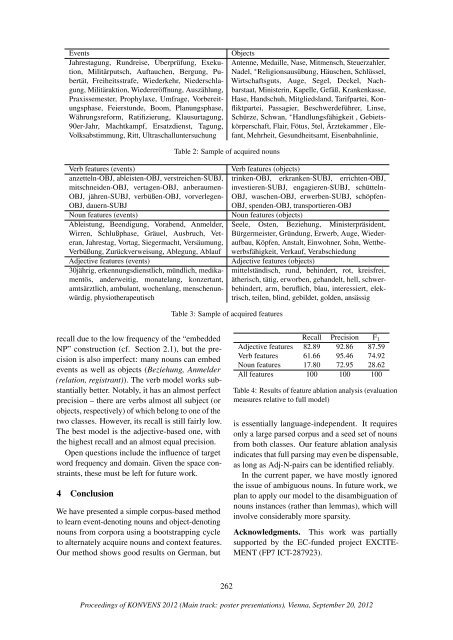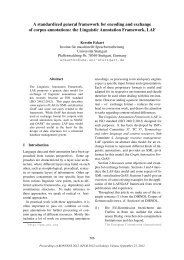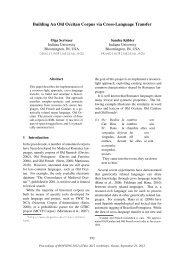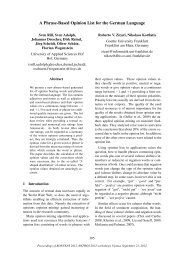Proceedings - Österreichische Gesellschaft für Artificial Intelligence
Proceedings - Österreichische Gesellschaft für Artificial Intelligence
Proceedings - Österreichische Gesellschaft für Artificial Intelligence
You also want an ePaper? Increase the reach of your titles
YUMPU automatically turns print PDFs into web optimized ePapers that Google loves.
Events<br />
Jahrestagung, Rundreise, Überprüfung, Exekution,<br />
Militärputsch, Auftauchen, Bergung, Pubertät,<br />
Freiheitsstrafe, Wiederkehr, Niederschlagung,<br />
Militäraktion, Wiedereröffnung, Auszählung,<br />
Praxissemester, Prophylaxe, Umfrage, Vorbereitungsphase,<br />
Feierstunde, Boom, Planungsphase,<br />
Währungsreform, Ratifizierung, Klausurtagung,<br />
90er-Jahr, Machtkampf, Ersatzdienst, Tagung,<br />
Volksabstimmung, Ritt, Ultraschalluntersuchung<br />
Objects<br />
Antenne, Medaille, Nase, Mitmensch, Steuerzahler,<br />
Nadel, ∗ Religionsausübung, Häuschen, Schlüssel,<br />
Wirtschaftsguts, Auge, Segel, Deckel, Nachbarstaat,<br />
Ministerin, Kapelle, Gefäß, Krankenkasse,<br />
Hase, Handschuh, Mitgliedsland, Tarifpartei, Konfliktpartei,<br />
Passagier, Beschwerdeführer, Linse,<br />
Schürze, Schwan, ∗ Handlungsfähigkeit , Gebietskörperschaft,<br />
Flair, Fötus, 5tel, Ärztekammer , Elefant,<br />
Mehrheit, Gesundheitsamt, Eisenbahnlinie,<br />
Table 2: Sample of acquired nouns<br />
Verb features (events)<br />
anzetteln-OBJ, ableisten-OBJ, verstreichen-SUBJ,<br />
mitschneiden-OBJ, vertagen-OBJ, anberaumen-<br />
OBJ, jähren-SUBJ, verbüßen-OBJ, vorverlegen-<br />
OBJ, dauern-SUBJ<br />
Noun features (events)<br />
Ableistung, Beendigung, Vorabend, Anmelder,<br />
Wirren, Schlußphase, Gräuel, Ausbruch, Veteran,<br />
Jahrestag, Vortag, Siegermacht, Versäumung,<br />
Verbüßung, Zurückverweisung, Ablegung, Ablauf<br />
Adjective features (events)<br />
30jährig, erkennungsdienstlich, mündlich, medikamentös,<br />
anderweitig, monatelang, konzertant,<br />
amtsärztlich, ambulant, wochenlang, menschenunwürdig,<br />
physiotherapeutisch<br />
Verb features (objects)<br />
trinken-OBJ, erkranken-SUBJ, errichten-OBJ,<br />
investieren-SUBJ, engagieren-SUBJ, schütteln-<br />
OBJ, waschen-OBJ, erwerben-SUBJ, schöpfen-<br />
OBJ, spenden-OBJ, transportieren-OBJ<br />
Noun features (objects)<br />
Seele, Osten, Beziehung, Ministerpräsident,<br />
Bürgermeister, Gründung, Erwerb, Auge, Wiederaufbau,<br />
Köpfen, Anstalt, Einwohner, Sohn, Wettbewerbsfähigkeit,<br />
Verkauf, Verabschiedung<br />
Adjective features (objects)<br />
mittelständisch, rund, behindert, rot, kreisfrei,<br />
ätherisch, tätig, erworben, gehandelt, hell, schwerbehindert,<br />
arm, beruflich, blau, interessiert, elektrisch,<br />
teilen, blind, gebildet, golden, ansässig<br />
Table 3: Sample of acquired features<br />
recall due to the low frequency of the “embedded<br />
NP” construction (cf. Section 2.1), but the precision<br />
is also imperfect: many nouns can embed<br />
events as well as objects (Beziehung, Anmelder<br />
(relation, registrant)). The verb model works substantially<br />
better. Notably, it has an almost perfect<br />
precision – there are verbs almost all subject (or<br />
objects, respectively) of which belong to one of the<br />
two classes. However, its recall is still fairly low.<br />
The best model is the adjective-based one, with<br />
the highest recall and an almost equal precision.<br />
Open questions include the influence of target<br />
word frequency and domain. Given the space constraints,<br />
these must be left for future work.<br />
4 Conclusion<br />
We have presented a simple corpus-based method<br />
to learn event-denoting nouns and object-denoting<br />
nouns from corpora using a bootstrapping cycle<br />
to alternately acquire nouns and context features.<br />
Our method shows good results on German, but<br />
Recall Precision F 1<br />
Adjective features 82.89 92.86 87.59<br />
Verb features 61.66 95.46 74.92<br />
Noun features 17.80 72.95 28.62<br />
All features 100 100 100<br />
Table 4: Results of feature ablation analysis (evaluation<br />
measures relative to full model)<br />
is essentially language-independent. It requires<br />
only a large parsed corpus and a seed set of nouns<br />
from both classes. Our feature ablation analysis<br />
indicates that full parsing may even be dispensable,<br />
as long as Adj-N-pairs can be identified reliably.<br />
In the current paper, we have mostly ignored<br />
the issue of ambiguous nouns. In future work, we<br />
plan to apply our model to the disambiguation of<br />
nouns instances (rather than lemmas), which will<br />
involve considerably more sparsity.<br />
Acknowledgments. This work was partially<br />
supported by the EC-funded project EXCITE-<br />
MENT (FP7 ICT-287923).<br />
262<br />
<strong>Proceedings</strong> of KONVENS 2012 (Main track: poster presentations), Vienna, September 20, 2012





